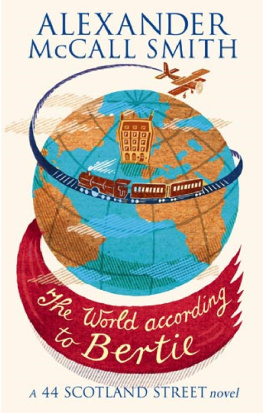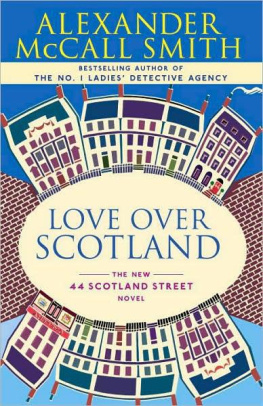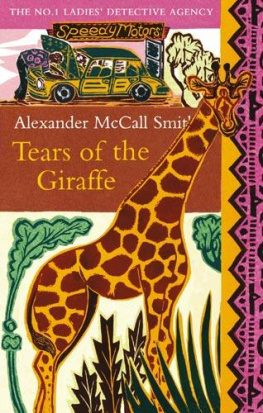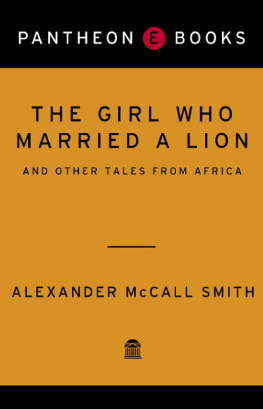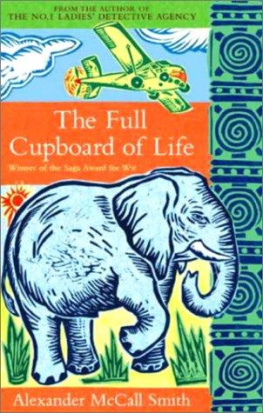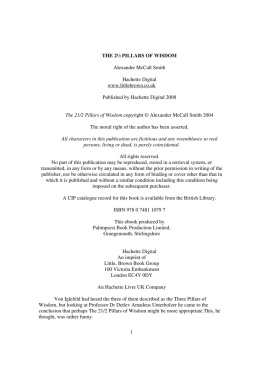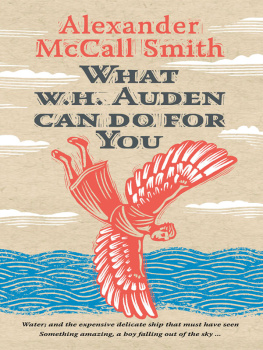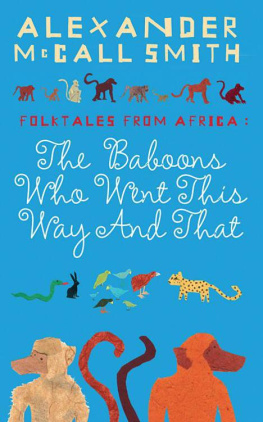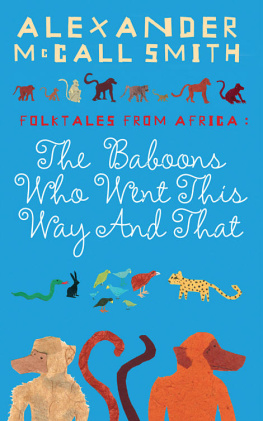Alexander McCall Smith - The comforts of a muddy Saturday
Here you can read online Alexander McCall Smith - The comforts of a muddy Saturday full text of the book (entire story) in english for free. Download pdf and epub, get meaning, cover and reviews about this ebook. year: 2008, publisher: Pantheon Books, genre: Science fiction. Description of the work, (preface) as well as reviews are available. Best literature library LitArk.com created for fans of good reading and offers a wide selection of genres:
Romance novel
Science fiction
Adventure
Detective
Science
History
Home and family
Prose
Art
Politics
Computer
Non-fiction
Religion
Business
Children
Humor
Choose a favorite category and find really read worthwhile books. Enjoy immersion in the world of imagination, feel the emotions of the characters or learn something new for yourself, make an fascinating discovery.

- Book:The comforts of a muddy Saturday
- Author:
- Publisher:Pantheon Books
- Genre:
- Year:2008
- Rating:5 / 5
- Favourites:Add to favourites
- Your mark:
- 100
- 1
- 2
- 3
- 4
- 5
The comforts of a muddy Saturday: summary, description and annotation
We offer to read an annotation, description, summary or preface (depends on what the author of the book "The comforts of a muddy Saturday" wrote himself). If you haven't found the necessary information about the book — write in the comments, we will try to find it.
Alexander McCall Smith: author's other books
Who wrote The comforts of a muddy Saturday? Find out the surname, the name of the author of the book and a list of all author's works by series.
The comforts of a muddy Saturday — read online for free the complete book (whole text) full work
Below is the text of the book, divided by pages. System saving the place of the last page read, allows you to conveniently read the book "The comforts of a muddy Saturday" online for free, without having to search again every time where you left off. Put a bookmark, and you can go to the page where you finished reading at any time.
Font size:
Interval:
Bookmark:
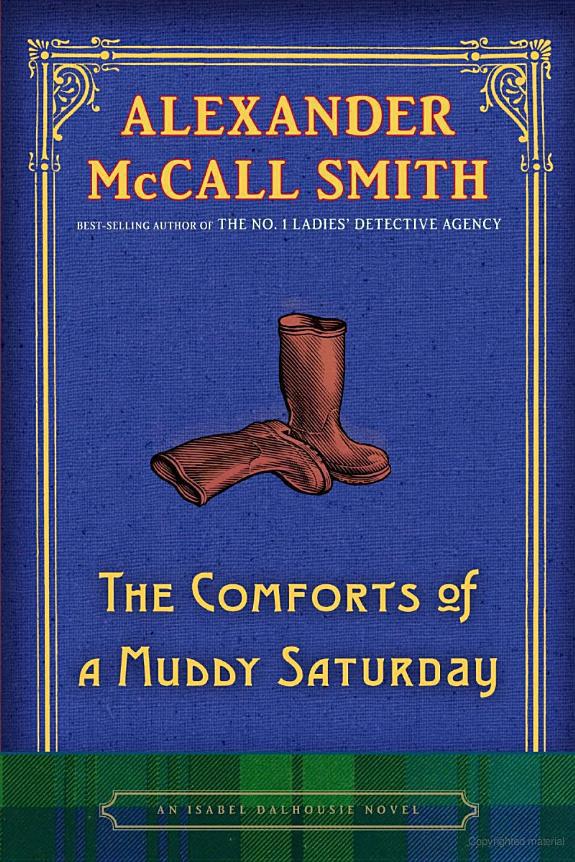
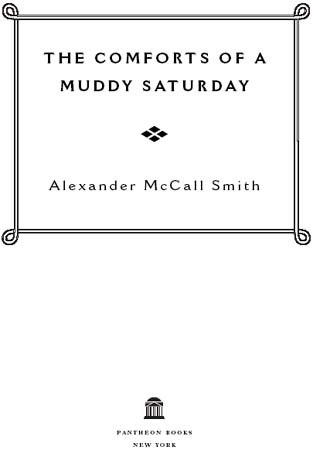
Contents
This book is for Amy Tan
CHAPTER ONE

W HAT MADE ISABEL DALHOUSIE think about chance? It was one of those curious coincidencesan inconsequential oneas when we turn the corner and find ourselves face-to-face with the person weve just been thinking about. Or when we answer the telephone and hear at the other end the voice of the friend we had been about to call. These things make us believe either in telepathyfor which there is as little hard evidence as there is, alas, for the existence of Santa Clausor in pure chance, which we flatter ourselves into thinking plays a small role in our lives. Yet chance, Isabel thought, determines much of what happens to us, from the original birth lottery onwards. We like to think that we plan what happens to us, but it is chance, surely, that lies behind so many of the great events of our livesthe meeting with the person with whom we are destined to spend the rest of our days, the receiving of a piece of advice which influences our choice of career, the spotting of a particular house for sale; all of these may be put down to pure chance, and yet they govern how our lives work out and how happyor unhappywe are going to be.
It happened when she was walking with Jamie across the Meadows, the large, tree-lined park that divides South Edinburgh from the Old Town. Jamie was herWhat was he? Her loverher younger loverher boyfriend; the father of her child. She was reluctant to use the word partner because it has associations of impermanence and business arrangements. Jamie was most definitely not a business arrangement; he was her north, her south, to quote Auden, whom she had recently decided she would quote less frequently. But even in the making of that resolution, she had found a line from Auden that seemed to express it all, and had given up on that ambition. And why, she asked herself, should one not quote those who saw the world more clearly than one did oneself?
Her north, her south; well, now they were walking north, on one of those prolonged Scottish summer evenings when it never really gets dark, and when one might forget just how far from south one really is. The fine weather had brought people out onto the grass; a group of young men, bare-chested in the unaccustomed warmth, were playing a game of football, discarded tee-shirts serving as the goal markers; a man was throwing a stick for a tireless border collie to fetch; a young couple lay stretched out, the girls head resting on the stomach of a bearded youth who was looking away, at something in the sky that only he could see. The air was heavy, and although it would soon be eight oclock, there was still a good deal of sunlight aboutsoft, slanting sunlight, with the quality that goes with light that has been about for the whole day and is now comfortable, used.
The coincidence was that Jamie should suddenly broach the subject of what it must be like to feel thoroughly ashamed of oneself. Later on she asked herself why he had suddenly decided to talk about that. Had he seen something on the Meadows to trigger such a line of thought? Strange things were no doubt done in parks by shameless people, but hardly in the early evening, in full view of passersby, on an evening such as this. Had he seen some shameless piece of exhibitionism? She had read recently of a Catholic priest who went jogging in the nude, and explained that he did so on the grounds that he sweated profusely when he took exercise. Indeed, for such a person it might be more convenient not to be clad, but this was not Sparta, where athletes disported naked in the palaestra; this was Scotland, where it was simply too cold to do as in Sparta, no matter how classically minded one might be.
Whatever it was that prompted Jamie, he suddenly remarked: What would it be like not to be able to go out in case people recognised you? What if you had done something soso appalling that you couldnt face people?
Isabel glanced at him. You havent, have you?
He smiled. Not yet.
She looked up at the skyline, at the conical towers of the old Infirmary, at the crouching lion of Arthurs Seat in the distance, beyond a line of trees. Some who have done dreadful things dont feel it at all, she said. They have no sense of shame. And maybe thats why they did it in the first place. They dont care what others think of them.
Jamie thought about this for a moment. But there are plenty of others, arent there? People who have done something out of character. People who have a conscience and who yet suddenly have given in to passing temptation. Some dark urge. They must feel ashamed of themselves, dont you think?
Isabel agreed. Yes, they must. And I feel so sorry for them. It had always struck her as wrong that we should judge ourselvesor, more usually, othersby single acts, as if a single snapshot said anything about what a person had been like over the whole course of his life. It could say something, of course, but only if it was typical of how that person behaved; otherwise, no, all it said was that at that moment, in those particular circumstances, temptation won a local victory.
They walked on in silence. Then Isabel said, And what about being made to feel ashamed of what you are? About being who you are.
But do people feel that?
Isabel thought that they did. Plenty of people feel ashamed of being poor, she said. They shouldnt, but many do. Then some feel ashamed of being a different colour from those around them. Again, they shouldnt. And others feel ashamed of not being beautiful, of having the wrong sort of chin. Of having the wrong number of chins. All of these things.
Its ridiculous.
Of course it is. Jamie, she realised, could say that; the blessed do not care from what angle they are regarded, as AudenShe stopped herself, and thought instead of moral progress, of how much worse it had been only a few decades ago. Things had changed for the better: now people asserted their identities with pride; they would not be cowed into shame. Yet so many lives had been wasted, had been ruined, because of unnecessary shame.
She remembered a friends mother who had discovered, at the age of twelve, that she was illegitimate, that the father who had been said to have been killed in an accident was simply not there, a passing, regretted dalliance that had resulted in her birth. Today that meant very little, when vast cohorts of children sprang forth from maternity hospitals without fathers who had signed up to anything, but for that woman, Isabel had been told, the rest of her life, from twelve onwards, was to be spent in shame. And with that shame there came the fear that others would find out about her illegitimacy, would stumble upon her secret. Stolen lives, Isabel thought, lives from which the joy had been extracted; and yet we could not banish shame altogethershe herself had written that in one of her editorials in the Review of Applied Ethics, in a special issue on the emotions. Without shame, guilt became a toothless thing, a prosecutor with no penalties up his sleeve.
They were on their way to a dinner party, and had decided to walk rather than call a taxi, since the evening was so inviting. Their host lived in Ramsay Garden, a cluster of flats clinging to the edge of the Castle Rock like an impossible set constructed by some operatic visionary and then left for real people to move into. From the shared courtyard below, several cream-harled buildings, with tagged-on staircases and balconies, grew higgledy-piggledy skywards, their scale and style an odd mixture of Arts and Crafts and Scottish baronial. It was an expensive place to live, much sought-after for the views which the flats commanded over Princes Street and the Georgian New Town beyond.
Next pageFont size:
Interval:
Bookmark:
Similar books «The comforts of a muddy Saturday»
Look at similar books to The comforts of a muddy Saturday. We have selected literature similar in name and meaning in the hope of providing readers with more options to find new, interesting, not yet read works.
Discussion, reviews of the book The comforts of a muddy Saturday and just readers' own opinions. Leave your comments, write what you think about the work, its meaning or the main characters. Specify what exactly you liked and what you didn't like, and why you think so.

